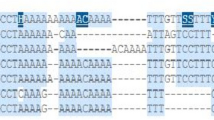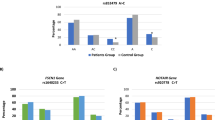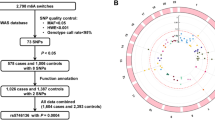Abstract
Background
It has been proposed that single nucleotide polymorphisms (SNPs) in microRNAs (miRNAs) could affect the expression of the miRNA and contribute to the susceptibility of human tumors. However, the role of genetic variant (T/C) in miR-196a-2 in gastric cancer susceptibility is still unknown.
Objectives
To evaluate the association between genetic polymorphism of miR-196a-2 (rs11614913) and risk of gastric cancer, a hospital-based case–control study was conducted in a Chinese population.
Methods
The miR-196a-2 polymorphism was determined using the method of polymerase chain reaction (PCR)–restriction fragment length polymorphism (RFLP) in 213 gastric cancer patients and 213 age- and sex-matched controls.
Results
In the present study, we found that a significantly increased risk of gastric cancer in subjects with the variant homozygote CC of miR-196a-2 compared with wild-type homozygote TT and heterozygote CT carriers (adjusted odds ratio (OR) = 1.57, 95% confidence interval (CI) = 1.03–2.39, P = 0.038). Stratified analyses indicated that the variant homozygote CC genotype had a strong association with lymph node metastasis of gastric cancer (adjusted OR = 2.25, 95% CI = 1.21–4.18, P = 0.011).
Conclusions
These findings suggest that the genetic variant within miR-196a-2 could play an important role in the development and progression of gastric cancer. We expect the findings may be helpful to better understand the mechanism of gastric carcinogenesis.
Similar content being viewed by others
Abbreviations
- CI:
-
Confidence interval
- OR:
-
Odds ratio
- PCR:
-
Polymerase chain reaction
- miRNAs:
-
microRNAs
- SNP:
-
Single nucleotide polymorphism
References
Parkin DM, Bray F, Ferlay J, Pisani P. Global cancer statistics, 2002. CA Cancer J Clin. 2005;55:74–108.
Wu MS, Chen CJ, Lin JT. Host–environment interactions: their impact on progression from gastric inflammation to carcinogenesis and on development of new approaches to prevent and treat gastric cancer. Cancer Epidemiol Biomarkers Prev. 2005;14:1878–1882.
Correa P, Schneider BG. Etiology of gastric cancer: what is new? Cancer Epidemiol Biomarkers Prev. 2005;14:1865–1868.
Bartel DP. MicroRNAs: genomics, biogenesis, mechanism, and function. Cell. 2004;116:281–297.
Carthew RW. Gene regulation by microRNAs. Curr Opin Genet Dev. 2006;16:203–208.
Iwai N, Naraba H. Polymorphisms in human pre-miRNAs. Biochem Biophys Res Commun. 2005;331:1439–1444.
Yu Z, Li Z, Jolicoeur N, et al. Aberrant allele frequencies of the SNPs located in microRNA target sites are potentially associated with human cancers. Nucleic Acids Res. 2007;35:4535–4541.
Hu Z, Chen J, Tian T, et al. Genetic variants of miRNA sequences and non-small cell lung cancer survival. J Clin Invest. 2008;118:2600–2608.
Tian T, Shu Y, Chen J, et al. A functional genetic variant in microRNA-196a2 is associated with increased susceptibility of lung cancer in Chinese. Cancer Epidemiol Biomarkers Prev. 2009;18:1183–1187.
Gianfagna F, De Feo E, van Duijn CM, Ricciardi G, Boccia S. A systematic review of meta-analyses on gene polymorphisms and gastric cancer risk. Curr Genomics. 2008;9:361–374.
Roberts-Thomson IC, Butler WJ. Polymorphism and gastric cancer. J Gastroenterol Hepatol. 2005;20:793–794.
Mishra PJ, Mishra PJ, Banerjee D, Bertino JR. MiRSNPs or MiR-polymorphisms, new players in microRNA mediated regulation of the cell: introducing microRNA pharmacogenomics. Cell Cycle. 2008;7:853–858.
Saunders MA, Liang H, Li WH. Human polymorphism at microRNAs and microRNA target sites. Proc Natl Acad Sci USA. 2007;104:3300–3305.
Wu M, Jolicoeur N, Li Z, et al. Genetic variations of microRNAs in human cancer and their effects on the expression of miRNAs. Carcinogenesis. 2008;29:1710–1716.
Jazdzewski K, Murray EL, Franssila K, Jarzab B, Schoenberg DR, de la Chapelle A. Common SNP in pre-miR-146a decreases mature miR expression and predisposes to papillary thyroid carcinoma. Proc Natl Acad Sci USA. 2008;105:7269–7274.
Xu T, Zhu Y, Wei QK, et al. A functional polymorphism in the miR-146a gene is associated with the risk for hepatocellular carcinoma. Carcinogenesis. 2008;29:2126–2131.
Hu Z, Liang J, Wang Z, et al. Common genetic variants in pre-microRNAs were associated with increased risk of breast cancer in Chinese women. Hum Mutat. 2009;30:79–84.
Ye Y, Wang KK, Gu J, et al. Genetic variations in microRNA-related genes are novel susceptibility loci for esophageal cancer risk. Cancer Prev Res (Phila Pa). 2008;1:460–469.
Lu J, Getz G, Miska EA, et al. MicroRNA expression profiles classify human cancers. Nature. 2005;435:834–838.
Volinia S, Calin GA, Liu CG, et al. A microRNA expression signature of human solid tumors defines cancer gene targets. Proc Natl Acad Sci USA. 2006;103:2257–2261.
Iorio MV, Ferracin M, Liu CG, et al. MicroRNA gene expression deregulation in human breast cancer. Cancer Res. 2005;65:7065–7070.
Schimanski CC, Frerichs K, Rahman F, et al. High miR-196a levels promote the oncogenic phenotype of colorectal cancer cells. World J Gastroenterol. 2009;15:2089–2096.
Calin GA, Ferracin M, Cimmino A, et al. A MicroRNA signature associated with prognosis and progression in chronic lymphocytic leukemia. N Engl J Med. 2005;353:1793–1801.
Duan R, Pak C, Jin P. Single nucleotide polymorphism associated with mature miR-125a alters the processing of pri-miRNA. Hum Mol Genet. 2007;16:1124–1131.
Yekta S, Shih IH, Bartel DP. MicroRNA-directed cleavage of HOXB8 mRNA. Science. 2004;304:594–596.
Luthra R, Singh RR, Luthra MG, et al. MicroRNA-196a targets annexin A1: a microRNA-mediated mechanism of annexin A1 downregulation in cancers. Oncogene. 2008;27:6667–6678.
Yang YC, Wang SW, Wu IC, et al. A tumorigenic homeobox (HOX) gene expressing human gastric cell line derived from putative gastric stem cell. Eur J Gastroenterol Hepatol. 2009;21:1016–1023.
Yu G, Wang J, Chen Y, et al. Tissue microarray analysis reveals strong clinical evidence for a close association between loss of annexin A1 expression and nodal metastasis in gastric cancer. Clin Exp Metastasis. 2008;25:695–702.
Hung RJ, Boffetta P, Brennan P, et al. Genetic polymorphisms of MPO, COMT, MnSOD, NQO1, interactions with environmental exposures and bladder cancer risk. Carcinogenesis. 2004;25:973–978.
Acknowledgments
This work was supported by grants from the Science Foundation of the Health Bureau, Wuxi, PR China (No. XM0805); Special Foundation for High Degree Talents of Shihezi University, China (No. RCZX200686).
Conflict of Interest Statement
None declared.
Author information
Authors and Affiliations
Corresponding author
Rights and permissions
About this article
Cite this article
Peng, S., Kuang, Z., Sheng, C. et al. Association of MicroRNA-196a-2 Gene Polymorphism with Gastric Cancer Risk in a Chinese Population. Dig Dis Sci 55, 2288–2293 (2010). https://doi.org/10.1007/s10620-009-1007-x
Received:
Accepted:
Published:
Issue Date:
DOI: https://doi.org/10.1007/s10620-009-1007-x




